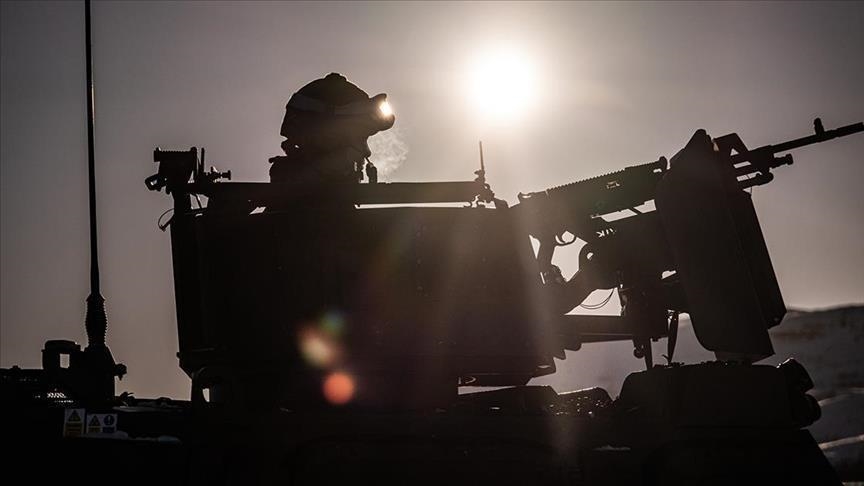EXPLAINER – Türkiye’s defense sector emerges as key in Europe’s rearming
From war in Ukraine to growing uncertainty over long-term US military presence in Europe, shifting dynamics are drawing increased attention to Türkiye’s burgeoning defense sector

- Türkiye’s defense exports have skyrocketed in recent years, rising from $2.3 billion in 2020 to over $7.1 billion in 2024, ranking it as the 11th largest arms exporter globally
- Analysts and officials agree that Türkiye is a compelling alternative for European nations scrambling to boost their capabilities and diversify suppliers
ISTANBUL
As geopolitical tensions reshape global security priorities, particularly in Europe, Türkiye’s defense industry is emerging as a pivotal force, expanding its global footprint through record exports, landmark partnerships and rapidly advancing technological capabilities.
From the war in Ukraine to uncertainty over the long-term US military presence in Europe, the continent is undergoing a profound strategic transformation.
Amid this shift, Ankara’s growing defense sector is gaining global traction, increasingly positioning itself as a sought-after international supplier.
Türkiye’s defense exports have skyrocketed accordingly, rising from $2.3 billion in 2020 to more than $7.1 billion in 2024, according to the Turkish Defense and Aerospace Industry Manufacturers Association.
A March report by the Stockholm International Peace Research Institute (SIPRI) ranked Türkiye as the world’s 11th largest arms exporter, with its share of global exports more than doubling from 0.8% in 2015-2019 to 1.7% in 2020-2024.
This growth is driven by gains in mass production and indigenous innovation, including cost-effective, combat-proven platforms like the Bayraktar TB2 drone, which earned global recognition in conflict zones such as Karabakh and Ukraine.
Europe turns to Türkiye amid rising profile in NATO
The ripple effects of the Ukraine war and a shifting transatlantic relationship have led European states to urgently reassess their defense postures.
As nations scramble to strengthen capabilities and diversify suppliers, Türkiye has emerged as a key alternative with battle-tested systems and reliable, timely delivery.
Türkiye’s defense exports to Europe surged to $1.2 billion in 2023, up from $369 million in 2020. They now account for 22% of the country’s total defense exports.
The NATO Leaders Summit in The Hague in late June gave further momentum to this trend. Pushed by US President Donald Trump, allied countries pledged to increase defense spending to 5% of GDP by 2035 – more than double the previous limit.
“Türkiye has a very big defense industrial base. Sometimes (we) forget what they have. I visited some of their companies – it’s really impressive,” NATO Secretary-General Mark Rutte said during the summit.
In late May, the EU also activated its new €150 billion ($171 billion) defense fund – the bloc’s first large-scale defense investment program.
EU foreign policy chief Kaja Kallas later told reporters that, as an EU candidate country, Türkiye could participate in joint projects. “We definitely see Türkiye as a security player,” she added.
Strategic integration into Europe’s defense ecosystem
Türkiye’s deepening integration into European defense structures is reflected in a wave of cross-border collaborations.
In March, leading drone maker Baykar Technologies partnered with Italy’s Leonardo to co-develop next-generation unmanned aerial vehicles (UAVs), blending AI-driven Turkish platforms with European aerospace expertise. The joint venture will operate at multiple sites in Italy and target the European UAV market.
In a parallel move, Baykar acquired Italy’s 140-year-old Piaggio Aerospace – a landmark step into European aviation manufacturing. Baykar accounted for one-third of Türkiye’s defense exports in 2023 and one-quarter of all defense and aerospace exports in 2024.
Separately, Turkish firm Repkon signed a deal with a top German defense contractor to co-produce 155mm artillery shells for the German army, part of Europe’s urgent effort to replenish stockpiles after heavy use in Ukraine.
Türkiye’s naval engineering footprint is also expanding.
In late 2024, Türkiye’s STM signed an agreement with Portugal to build two auxiliary replenishment and logistics vessels for the Portuguese Navy. Designed with modular, multifunctional capabilities, the ships will support power projection, amphibious operations and at-sea resupply.
Meanwhile, Turkish Aerospace Industries (TAI) secured an agreement in Spain to co-produce and export HURJET – Türkiye’s first indigenously developed jet trainer and light attack aircraft – tailored for next-generation pilot training and close air support.
Momentum continues across the continent
These headline-grabbing partnerships build on years of steady expansion.
Poland, the first EU and NATO member to purchase Bayraktar TB2 drones, received all 24 units by mid-2024. Albania and Croatia followed, with the latter also acquiring logistics, training and command-and-control systems.
In 2024, Aselsan launched a regional office in North Macedonia to coordinate activities across the Balkans. Havelsan, another key Turkish defense player, won a Romanian tender to modernize maritime surveillance using its MATRA software platform.
Together, observers say, these developments reflect Türkiye’s growing influence over the design and deployment of Europe’s future defense systems.
As Brussels opens the doors of its defense initiatives and Washington steps back, Türkiye’s ability to navigate both alliances and markets could reshape not only how Europe defends itself, but who builds it.
“We have to make sure that the Turkish defense industrial base is as closely connected as possible to the UK, Norway and the European Union,” NATO chief Rutte said in June. “Let’s not have these fences drawn up within NATO. It won’t help.”
Anadolu Agency website contains only a portion of the news stories offered to subscribers in the AA News Broadcasting System (HAS), and in summarized form. Please contact us for subscription options.







